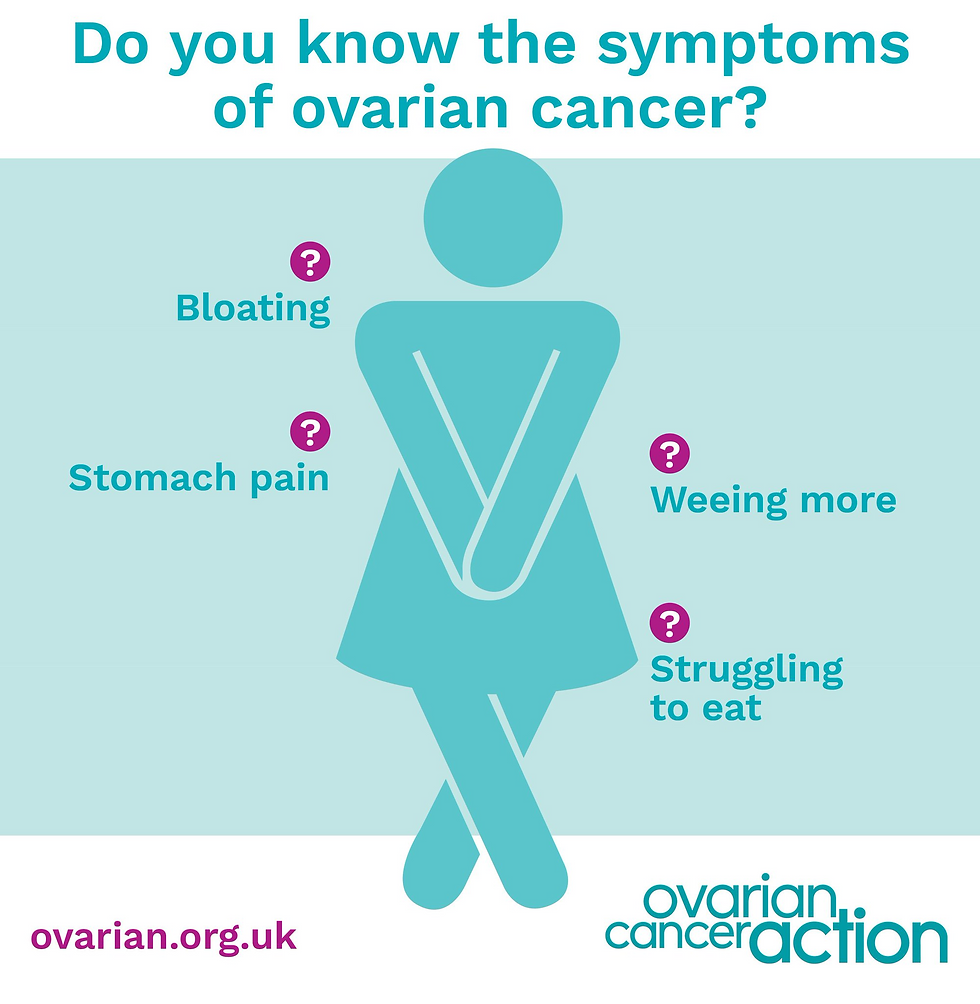World Ovarian Cancer Day
- mummyscrummie

- May 8, 2022
- 3 min read

Today, Sunday 8th May, is Mother's Day in the US and it's also World Ovarian Cancer Day. As some you will know, I lost my mother, to ovarian cancer, and so it seemed only right that today, I talk a wee bit about my experiences.
In January of 2019, three days after her 56th birthday, my mum was rushed into hospital, unable to breathe properly and with severe abdominal pain. She’d been complaining of swelling, discomfort and a massively decreased appetite for several months, but the her doctor was unable to give her any answers.
She was sent for x-rays by the A and E Department, and doctors discovered a huge mass, stretching from her pelvis to her breast bone. The next day, she was sent for biopsies of the mass, which proved to be a type of malignant tumour called a carcinoma, and she was formally diagnosed with stage four ovarian cancer; stage four meaning that the cancer had grown and aggressively spread (metastasised) from where it originated, attacking other organs of her body.
My sib and I were then officially given the news that Mum was terminally ill.
I can’t now do justice to how difficult that conversation with Mum’s oncologist was. For my sibling and I to be told (at 24 and 28 years old respectively) that Mum was going to die was simultaneously devastating, baffling, terrifying and completely surreal. The idea of losing our mother, whilst we were all still so young (my sib was planning their wedding, Mum was revelling in being a Grandma for the first time) was just completely nightmarish; all the more so for coming at us completely out of the blue.

Ovarian cancer is often left undetected because it presents, symptomatically, in a similar fashion to other conditions; the tell-tale signs are often mistakenly attributed to Irritable Bowel Syndrome, going through the menopause, or the menstrual cycle. Because of this, it’s often not caught until the cancer has spread, by which time a ‘cure’ becomes impossible, because, even if treatment (radiotherapy/ chemotherapy) is a success, there is a high chance of the cancer returning within a few years. Only half of all ovarian cancer patients live for five years after their diagnosis, most aren’t as ‘lucky’.
After her admission to hospital in January, and her terminal diagnosis; Mum was transferred to the palliative team for pain management and end-of-life care. Whilst waiting for tumour removal surgery to make her more comfortable, she developed a blood clot, and we were told that her surgery was off the cards: we were out of options, and that the year we had been advised that we had left with her, was now “maybe six months.”
In reality, those six months were two, and Mum died in March.

Ovarian cancer is most likely to affect women over the age of 50. Mum had repeatedly been to her doctor, describing her symptoms, and she was told at various stages that it was “probably a UTI”, “she’d put on weight over Christmas” and “it [was] perhaps the menopause”. She also had a family history of gynaecological cancers, and had previously had both breast cancer and spinal cancer.
There is absolutely no way that she should have slipped through the net in the way she did. She shouldn’t have died at 56 years old; one of the reasons she did is because, contrary to popular belief, ovarian cancer doesn’t show up on a smear test/cervical screening, there is no national screening process for ovarian cancer and people aren't quick to recognise the symptoms.
In March 2020, I corralled a group of my family and friends into completing Ovarian Cancer Action's Walk in Her Name step challenge; we raised over £6k for the charity and for the development of a screening tool.

Screening will make a massive difference in the 'survivability' of this disease, but it is still some way off; so for now, all any of us can do is know the symptoms, be aware and make sure the women you love do and are too.

More information available at ovarian.org.uk




Comments